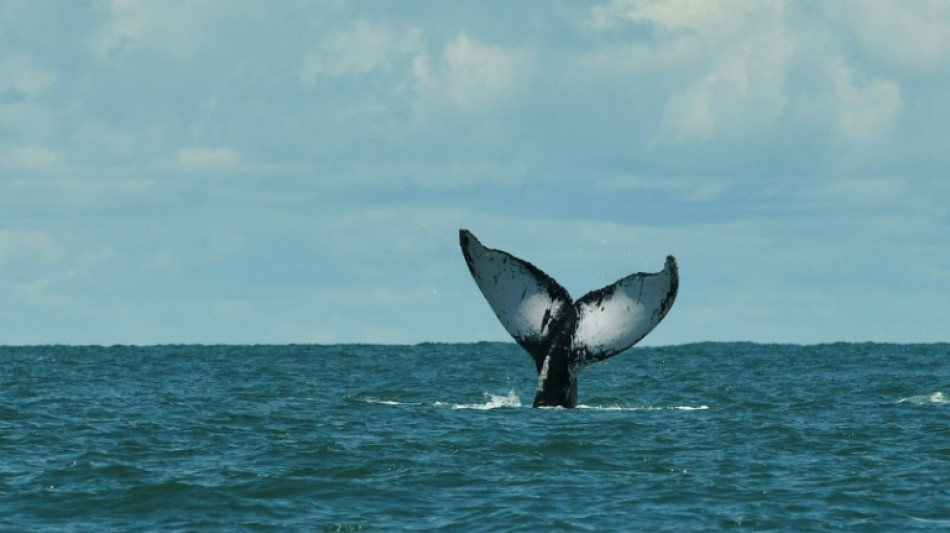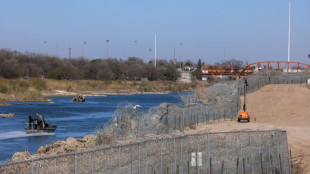
-
 Mbappe can be Real Madrid 'legend' like Ronaldo: Ancelotti
Mbappe can be Real Madrid 'legend' like Ronaldo: Ancelotti
-
Saka 'ready to go' for Arsenal after long injury lay-off: Arteta

-
 Aston Martin to sell stake in Formula One team
Aston Martin to sell stake in Formula One team
-
Three talking points ahead of clay-court season

-
 French court hands Le Pen five-year election ban
French court hands Le Pen five-year election ban
-
Probe accuses ex J-pop star Nakai of sexual assault

-
 Japan leads hefty global stock market losses on tariff woes
Japan leads hefty global stock market losses on tariff woes
-
Saka 'ready to go' after long injury lay-off: Arteta

-
 Ingebrigtsen Sr, on trial for abusing Olympic champion, says he was 'overly protective'
Ingebrigtsen Sr, on trial for abusing Olympic champion, says he was 'overly protective'
-
Tourists and locals enjoy 'ephemeral' Tokyo cherry blossoms

-
 Khamenei warns of 'strong' response if Iran attacked
Khamenei warns of 'strong' response if Iran attacked
-
France fines Apple 150 million euros over privacy feature

-
 UK PM urges nations to smash migrant smuggling gangs 'once and for all'
UK PM urges nations to smash migrant smuggling gangs 'once and for all'
-
Thai authorities probe collapse at quake-hit construction site

-
 France's Le Pen convicted in fake jobs trial
France's Le Pen convicted in fake jobs trial
-
Chinese tech giant Huawei says profits fell 28% last year

-
 Trump says confident of TikTok deal before deadline
Trump says confident of TikTok deal before deadline
-
Myanmar declares week of mourning as hopes fade for quake survivors

-
 Japan's Nikkei leads hefty market losses, gold hits record
Japan's Nikkei leads hefty market losses, gold hits record
-
Tears in Taiwan for relatives hit by Myanmar quake

-
 Venezuela says US revoked transnational oil, gas company licenses
Venezuela says US revoked transnational oil, gas company licenses
-
'Devastated': Relatives await news from Bangkok building collapse

-
 Arsenal, Tottenham to play pre-season North London derby in Hong Kong
Arsenal, Tottenham to play pre-season North London derby in Hong Kong
-
Japan's Nikkei leads hefty equity market losses; gold hits record

-
 Israel's Netanyahu picks new security chief, defying legal challenge
Israel's Netanyahu picks new security chief, defying legal challenge
-
Trump says US tariffs to hit 'all countries'

-
 Prayers and tears for Eid in quake-hit Mandalay
Prayers and tears for Eid in quake-hit Mandalay
-
After flops, movie industry targets fresh start at CinemaCon

-
 Tsunoda targets podium finish in Japan after 'unreal' Red Bull move
Tsunoda targets podium finish in Japan after 'unreal' Red Bull move
-
French chefs await new Michelin guide

-
 UK imposes travel permit on Europeans from Wednesday
UK imposes travel permit on Europeans from Wednesday
-
At his academy, Romanian legend Hagi shapes future champions

-
 Referee's lunch break saved Miami winner Mensik from early exit
Referee's lunch break saved Miami winner Mensik from early exit
-
Djokovic refuses to discuss eye ailment after shock Miami loss

-
 Mitchell magic as Cavs bag 60th win, Pistons and T'Wolves brawl
Mitchell magic as Cavs bag 60th win, Pistons and T'Wolves brawl
-
Mensik shocks Djokovic to win Miami Open

-
 Duterte lawyer: 'compelling' grounds to throw case out
Duterte lawyer: 'compelling' grounds to throw case out
-
What happens on Trump's 'Liberation Day' and beyond?

-
 Clock ticks on Trump's reciprocal tariffs as countries seek reprieve
Clock ticks on Trump's reciprocal tariffs as countries seek reprieve
-
Japan-Australia flagship hydrogen project stumbles

-
 Musk deploys wealth in bid to swing Wisconsin court vote
Musk deploys wealth in bid to swing Wisconsin court vote
-
Mensik upsets Djokovic to win Miami Open

-
 China manufacturing activity grows at highest rate in a year
China manufacturing activity grows at highest rate in a year
-
'Waited for death': Ex-detainees recount horrors of Sudan's RSF prisons

-
 Japan's Nikkei leads big losses in Asian markets as gold hits record
Japan's Nikkei leads big losses in Asian markets as gold hits record
-
Rescue hopes fading three days after deadly Myanmar quake

-
 'Basketbrawl' as seven ejected in Pistons-Wolves clash
'Basketbrawl' as seven ejected in Pistons-Wolves clash
-
Four men loom large in Microsoft history

-
 Computer pioneer Microsoft turns 50 in the age of AI
Computer pioneer Microsoft turns 50 in the age of AI
-
Trump calls out both Putin and Zelensky over ceasefire talks


Protecting 30 percent of oceans a huge challenge for the planet
How do we go from protecting eight percent of marine areas to 30 percent in less than 10 years? This question is at the heart of a global forum in Canada this weekend aiming to save marine ecosystems under threat from overfishing, pollution and climate change.
On the heels of the historic biodiversity agreement signed at COP15 in Montreal late last year, about 3,000 officials, scientists, NGOs and Indigenous groups are meeting in Vancouver for the fifth International Marine Protected Areas Congress (IMPAC5), which opened Friday and runs until February 9.
Scientists have said the meeting is crucial for setting up a framework to reach the agreed target at COP15 of protecting 30 percent of the planet's lands and oceans by 2030.
It's an immense step for ocean conservation, which will see a tripling of areas made off-limits to most human activities, with an aim to preserve sensitive ecosystems and species at risk.
The summit, usually held every four years, is taking place two years late due to the Covid-19 pandemic.
"We must re-think our policies, economies, priorities, and processes in ways that reflect the important role nature plays in our own health, equity, well-being and economic sustainability," said host Canada, which has some of the world's longest coastlines.
Covering almost three-quarters of the earth's surface, oceans are home to a quarter of known species and absorb 30 percent of CO2 emissions from human activities.
"COP15 marked a historic inflection point in conservation efforts for nature... but the pressure is on now not just to reach the numerical target, but to make sure that we do it right, that our marine protected areas are in the right places (and) that they're managed well," Pepe Clarke of the World Wide Fund For Nature (WWF) told AFP.
Some experts fear the "politics of figures."
- Resistance to climate change -
Biodiversity hotspots or particularly vulnerable areas that deserve urgent conservation measures have been identified, scientists have said.
Now it is essential to have discussions to "establish a global network, ecologically representative and which adequately protects the whole range of ecosystem types," according to Clarke.
Especially since protecting and managing our oceans more sustainably will make them more resistant to climate change.
But even if the world achieves "the ambitious target of protecting 30 percent of the oceans by 2030 within high-quality (marine protected areas), the goals of the framework cannot be fully met without appropriate management of the other 70 percent of the oceans," said the Pew Charitable Trusts, a non-profit.
For Sian Owen, director of the Deep Sea Conservation Coalition (DSCC), "it is crucial that both existing and emerging industries that threaten our deep ocean are quickly and unequivocally rejected and that we sustainably manage the remaining 70 percent."
UN member states will meet again at the end of February to try and hammer out a treaty for the protection of the high seas, a session that should in principle be the last.
Protecting international waters, which cover nearly half the planet, is crucial for the health of the entire ocean and its biodiversity, and for limiting global warming.
"Governments must restrict activities that destroy and disturb vital ecosystems that support life on Earth," said DSCC.
O.M.Souza--AMWN



